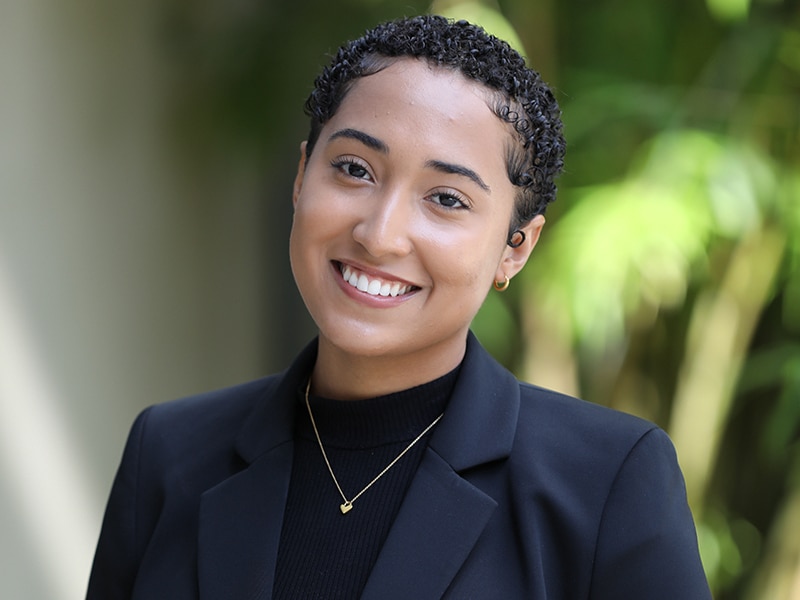
Specialized master’s joint degrees
Pursue more
It’s no secret: Today’s professionals are expected to know more. Like financial laws alongside investment strategies. Or the legal aspects of breaking ground for construction projects.
So, where — and how — do you acquire this information? You could put in the painstaking article-by-article independent legwork. Or, you could jump-start your professional growth with one of the Warrington College of Business’s graduate joint degrees.
If accepted into one of these competitive and immersive tracks, you’ll explore law, medicine, management or another discipline alongside a specialty focus and get the experiences that push you closer to your aspirations. Department leader, tax lawyer or corporate banking expert: How does that sound?

All joint degrees
Now’s your chance to craft a unique and individualized career. Combine one of our specialized master’s degrees with an MBA, JD, MD or another UF graduate program.
JD/MS in Real Estate
Whether for new construction, community expansion or infrastructure upgrades, blueprints plus laws provide the framework, and this joint degree program builds your knowledge of both.

This unique program offered jointly through the Levin College of Law and the Warrington College of Business allows students to complete both the Juris Doctor and the Nathan S. Collier Master of Science in Real Estate degrees in three years.
Thirty-four credit hours are required to complete the MS in Real Estate degree. However, joint degree students may obtain a Master’s degree in Real Estate by completing just 22 hours of Real Estate coursework in the business school.
- Twelve credit hours of law classes satisfy the remaining 12 hours of MS in Real Estate coursework.
- Joint degree students typically do full-time legal internships during the summer and do not take MS in Real Estate classes.
Program contacts
Courtney Mack
Director, Admission Operations & Student Services — MS in Real Estate
Email Courtney
Hough Hall 206
Schedule a call
Brian Mitchell
Assistant Dean for Student Affairs
UF Levin College of Law
352.273.0620
Email
Admission to the JD/MS in Real Estate program
Admission to the Nathan S. Collier Master of Science in Real Estate Program is competitive and based on several factors, including undergraduate GPA and test scores. Prior coursework or work experience in real estate, finance, accounting, or economics strengthens the student’s application but is not required.
Law school applicants must apply to the MS in Real Estate program before the end of their fourth law school semester. However, earlier applications are encouraged as they allow more time to schedule and complete the required 22 hours of Real Estate coursework.
Early enrollment also allows accepted joint degree students to access the Bergstrom Center’s Advisory Board and participate in Bergstrom Center activities.
To qualify for joint degree status, current law students must be admitted into the MS in Real Estate program by the end of their fourth law school semester, although earlier applications are strongly encouraged.
Application instructions
Please submit the Graduate School Application. When completing the online application, choose: “Primary Program”, look for “Real Estate”, and then select your desired entry term: “Fall” or “Spring.”
Competitive applicants will be interviewed by the MS in Real Estate admission committee. Admission decisions are generally conveyed to applicants shortly after the admission interview. Failure to provide the required documents will delay the processing of your application.
MBA/MS in Real Estate
Establish your foundation for closing deals, spearheading new developments, and leading regional teams to record sales.

The combination MBA/MS in Real Estate shares eight credits and takes about three years to complete. If a student intends to pursue a joint degree within these areas, they should apply to both programs simultaneously so that decisions can be communicated and academic plans managed.
Program contacts
Naz Erenguc
Director of Admissions — MBA
352.273.1836
Email
Courtney Mack
Director, Admission Operations & Student Services — MS in Real Estate
Email Courtney
Hough Hall 206
Schedule a call
MBA/MS in Information Systems and Operations Management
You’re not just ready to enforce IT strategies, identify insights, or support supply chain operations but also to direct these developments and the individuals making them happen. Explore concentrations in Data Analytics, Information Technology, and Supply Chain Management.

The combination MBA/MS in Information Systems and Operations Management shares eight credits. The total length of time for most of the combination degrees is three years. If a student intends to pursue a combination degree within these areas, they should apply to both programs simultaneously so that decisions can be communicated and academic plans managed.
Program contacts
Tracie N. Cohens, MBA, MA — MS in Information Systems and Operations Management
Hough Hall 202
352.273.0498
Email
Naz Erenguc
Director of Admissions — MBA
352.273.1836
Email
Natasha Plunkett, MBA, M.A. Ed — MS in Information Systems and Operations Management
Hough Hall 204
352.846.1370
Email
JD/Master of Accounting
From financial regulations to processes, this joint law-accounting program covers everything surrounding the SEC and provides candidates with advanced education in law and accounting.

The combination program culminates in the joint awarding of the Juris Doctor (JD) and the Master of Accounting (MAcc) degrees. The combination program is designed for students who have an undergraduate degree in accounting and are interested in advanced studies in both accounting and law.
The MAcc portion of the program offers three options: concentration in auditing, concentration in taxation, and no concentration. The combination program is open to students who have completed the equivalent of a major in accounting at the undergraduate level.
Currently enrolled students should use the JD/MAcc curriculum information to develop a plan of study.
Program reciprocity
The purpose of the program is to enable students to obtain the appropriate education in the most efficient manner possible. The combination program requires 20 fewer credits than would be required if the two degrees were earned separately. A student must satisfy the curriculum requirements for each degree. However, because certain courses may be used in partial satisfaction of the requirements of both degrees, the total hours required under the combination program is less than those that would be required if the programs were pursued separately
MAcc
In addition to the completion of all preparatory coursework, the Fisher School of Accounting requires completion of 34 semester hours of coursework in order to receive a MAcc degree. Under the joint degree program, the Fisher School of Accounting will allow a maximum of 10 credits of appropriate law courses to be applied towards the MAcc degree and will allow some communications course requirements to be met within the JD program. Application of the ten credits and satisfaction of the communications requirements are contingent on successful completion of the JD program. This means that a student who is admitted to the joint degree program but does not complete the JD requirements must complete the separate MAcc degree requirements including preparatory coursework in order to earn that degree.
JD
Reciprocally, the Levin College of Law will permit a maximum of 10 credits taken in the Fisher School of Accounting to be applied toward the JD degree. Two of these Fisher School of Accounting courses will be treated as the two graduate courses ordinarily allowed to be taken outside of the Levin College of Law for credit towards law school graduation. All accounting courses accepted must be offered at the graduate level (i.e., must be numbered 5000 or higher). The area requirements may be fulfilled only through law courses and no Fisher School of Accounting courses can be utilized for such purpose.
Candidates for the program must meet the entrance requirements and follow the entrance procedures for the for the Levin College of Law (JD) and Fisher School of Accounting (MAcc). Applications should specify for both units that the student is applying for the combination program.
Applicants must be accepted concurrently by both the Levin College of Law and Fisher School of Accounting.
Beginning students in the Levin College of Law are accepted only in August (fall start). All applicants for admission to the College of Law must hold (prior to beginning classes) a baccalaureate degree from a qualified institution and a satisfactory score on the Law School Admission Test (LSAT) or the GRE, unless they are eligible to apply through the Gator Scholars option. For information, visit Levin College of Law.
Policies relating to JD/MAcc program admissions
- Meeting the minimum standards does not guarantee admission to the MAcc program. Admission is selective. The student’s total record including past academic performance will be considered.
- Any student who participates in the combination degree program must have been accepted concurrently in both disciplines and must begin coursework in both disciplines no later than the beginning of the fourth academic term after commencement of study. Students admitted to the Levin College of Law but electing to spend their first year in the Fisher School of Accounting may enter the Levin College of Law thereafter without once again qualifying for admission as long as they are in good academic standing in the Graduate School and in the Fisher School of Accounting.
- Students admitted to the MAcc degree program who elect to spend their first year in the College of Law may enter the Fisher School of Accounting thereafter provided they remain in good standing in the Levin College of Law and their study begins no later than the beginning of the fourth academic term after commencement of study in the Levin College of Law.
- A student may take courses concurrently in both the Levin College of Law and the Fisher School of Accounting except that the first two terms of law school (Fall-Spring) and the first term of Fisher School of Accounting coursework must be taken as whole units.
- Students in the combination degree program will be subject to the standards of satisfactory performance required for continuation in each of the degree programs.
- Fisher School of Accounting courses which are to be applied toward the JD degree must carry a grade of “B” or better and will not be counted in the Levin College of Law grade point average. Levin College of Law courses which are to be applied toward the MAcc degree must carry a grade of “C” or better and will not be counted in the Fisher School of Accounting grade point average.
- Students enrolled in the combination program must be registered for a minimum of three hours in the Graduate School during the term in which they graduate. The three hours of registration must be in Graduate School courses, i.e., law school courses will not satisfy this requirement.
CPA information
The MAcc program is designed for students who desire a professional accounting career. While professional accountants can serve in many capacities, many MAcc graduates go on to become licensed as Certified Public Accountants (CPAs.) Students interested in becoming a CPA should consult the National Association of State Boards of Accountancy website for information regarding CPA exam and licensure eligibility for all states and jurisdictions.
- Florida Board of Accountancy, Phone: 850.487.1395
- National Association of State Boards of Accountancy
MD/MS in Management
Business fluency benefits all professionals — even doctors and medical researchers. Pursuing a Master of Science in Management (MSM) alongside your MD helps you build this vocabulary. Should you decide to go further, you can transition from the MSM to the Full-Time MBA program.

The MSM would add one additional year to a student’s medical degree progress. The MSM can be completed during the academic year between a student’s second and third or third and fourth years of medical school. All curriculum requirements can be completed in a total of five years.
Applicants can then apply to the MSM program in the Fall before they intend to begin the MSM degree. Should a student seek to continue their business studies, the MSM will transition to the Full-Time MBA program.
Program contact
Pratibha Singh
Associate Director of Recruitment — Master of International Business, MSM, and MS Marketing
(352) 273-0668
Email
Master’s + Master’s
Specialized business knowledge enhances and diversifies all types of career paths. Based on your interests and goals, consider pairing your master’s with an MS in Real Estate, a Master of International Business, an MS Marketing, or an MS in Management from Warrington.
Joint degree students can share a total of eight or nine credits between both graduate/professional programs, shortening the duration of the specialized master’s degree.

The joint degree is designed for students who seek to rise to the challenge of enrolling in a full-time specialized master’s in business program while also pursuing an additional professional, graduate, or doctoral degree.
- These programs share class credits, allowing certain credits to be counted toward both degrees.
- The listed duration of study for a given program is typically extended by one year, and students must be admitted by each program in order to qualify.
- Starting times for the joint degree program are flexible.
To apply
- Current UF Master’s student in good academic standing.
- Must have support from the current degree program
- Bachelor’s degree from an accredited institution
- Business major or minor
- Joint degree programs may also be open to non-business majors/minors with an exceptional academic record
- 3.0 upper-division undergraduate GPA (U.S. degrees only)
- Admission is separate for each degree program. Applicants applying to both a specialized master’s from Warrington and another graduate/professional degree program simultaneously should refer to each department’s admission requirements.
Program contacts
Pratibha Singh
Assoc Dir Recruitment — Master of International Business, MSM, and MS Marketing
(352) 273-0668
Email
Courtney Mack
Director, Admission Operations & Student Services — MS in Real Estate
Email Courtney
Hough Hall 206
Schedule a call
Non-traditional Ph.D. + Master’s
Your mission? Never stop learning. Your approach? Contributing to your discipline’s thought leadership with a Ph.D. and pursuing a specialized master’s in business alongside it. This non-traditional joint combination is available for Warrington’s Master of International Business, MS in Real Estate, MS Marketing, and MS in Management programs.

These joint degrees are geared toward UF doctoral students who wish to simultaneously earn a master’s outside of their doctoral department.
Joint degree students can share a total of eight to nine credits between both programs, shortening the duration of the specialized master’s degree.
The joint degree is designed for students who seek to rise to the challenge of enrolling in a full-time doctoral program while also pursuing an additional specialized master’s in business degree.
- These programs share class credits, allowing certain credits to be counted towards both degrees.
- The listed duration of study for a given program is typically extended by one year, and students must be admitted by each program in order to qualify.
- Starting times for the joint degree program are flexible.
To apply
- Current UF Ph.D. student in good academic standing.
- Must have support from the current degree program
- Bachelor’s degree from an accredited institution
- Business major or minor
- Joint degree programs are also open to non-business majors/minors with an exceptional academic record and international experience
- 3.0 upper-division undergraduate GPA (U.S. degrees only)
- Admission is separate for each degree program. Applicants applying to both a specialized master’s from Warrington and another degree program simultaneously should refer to each department’s admission requirements.
Program contacts
Pratibha Singh
Associate Director of Recruitment — Master of International Business, MSM, and MS Marketing
(352) 273-0668
Email
Kelly Herring
Director, William R. Hough Master of Science in Finance
(352) 392-9249
Fax: 352.392.0301
Email
Courtney Mack
Director, Admission Operations & Student Services — MS in Real Estate
Email Courtney
Hough Hall 206
Schedule a call
Student perspective

I have ambitions of working in-house for a prominent organization. My educational journey is equipping me with the comprehensive knowledge and tools, ensuring that I am a trusted resource for my future colleagues.
Scenic Mosley (MSRE, JD ’25)
What is a joint degree program?
As a joint degree student, you don’t just graduate with two respected credentials. You also gain an interdisciplinary perspective that powers your continued progress and equips you to tackle more complex challenges. Learn more about this format’s benefits:
Applied learning
Analyzing financial data with cutting-edge Bloomberg Terminals, delving into AI, legal externships and clerkships, and client projects take your knowledge beyond facts to real results, meaningful relationships, and an ever-expanding skill set.
Specialize
For mid-career professionals, “What do you do?” also pertains to your industry and responsibilities. As you plan your next move, a joint degree gives you the momentum to begin or accelerate this transition.
Authority
Become the doer and leader with a comprehensive, multifaceted understanding of your work, from legal factors and insider practices to the broad-reaching ramifications of your decisions.
Time saved
Eight to 12 shared credits fast-track your academic and professional aspirations and typically extend your studies by one additional year.

Expertise achieved
When you picture prestige, from leadership to publication opportunities, take the steps to unlock it with two impactful, in-demand degrees.